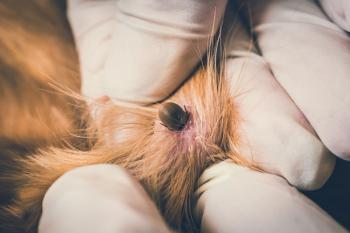
ClinQuiz: Eye on leptospirosis (Sponsored by Boehringer Ingelheim Vetmedica Inc.)
Do you know which dogs are at risk for leptospirosis? And do you know how to counteract misinformation about Leptospira vaccines? Learn how to help your canine patients avoid this communicable disease that's on the rise.
Case 1: A 7-year-old spayed female Maltese is brought to your veterinary clinic for an acute onset of lethargy, anorexia, and vomiting. The dog lives exclusively in the city and only goes for brief walks outside the home and occasionally at dog parks. On presentation, the patient is febrile, icteric, and 7% to 8% dehydrated. Laboratory results reveal azotemia, thrombocytopenia, and elevated liver enzyme activity. The dog's vaccination status is unknown.
Based on the history, clinical signs, and initial laboratory findings, what is your tentative diagnosis and what additional diagnostic testing would you perform?
Case 2: A 12-year-old spayed female Labrador retriever comes into your clinic with a presenting complaint of polyuria and polydipsia. The dog was vaccinated against leptospirosis two months ago with a four-way commercial vaccine. As a part of your diagnostic workup, you submit MAT titers for leptospirosis and receive the following results:
Leptospira bratislava – neg
L. grippotyphosa – 1:200
L. icterohemorrhagiae – 1:200
L. pomona – neg
L. autumnalis – neg
L. canicola – neg
L. hardjo – neg
How do you interpret these results and what should your next action step be?
Case 3: A client brings in his 16-week-old pug puppy for vaccination. The puppy lives exclusively in an urban setting, and the client does not travel with his dog. The client tells you that he was told by the breeder not to vaccinate against leptospirosis, as these vaccines have been shown to kill small dogs.
What is your response to address this client's concerns?
For more information on leptopsirosis and its prevention, visit
This quiz was provided by Carrie R. White, DVM, DACVIM, Staff Veterinarian, Department of Internal Medicine, The Animal Medical Center, New York, N.Y.
Dr. White completed a small animal internship at the Veterinary Referral and Emergency Center in Norwalk, Conn., and a small animal internal medicine residency at The Animal Medical Center in New York City. She is currently a staff internist at the Animal Medical Center. Her areas of interest include infectious disease and hematology.
Newsletter
From exam room tips to practice management insights, get trusted veterinary news delivered straight to your inbox—subscribe to dvm360.




